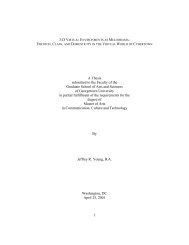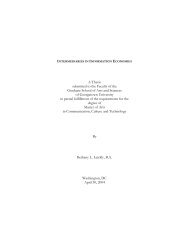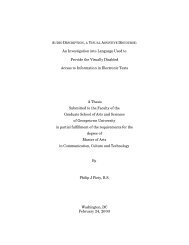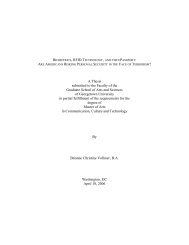A Comparative Case Study of Global Marketing and Ethnocentrism ...
A Comparative Case Study of Global Marketing and Ethnocentrism ...
A Comparative Case Study of Global Marketing and Ethnocentrism ...
You also want an ePaper? Increase the reach of your titles
YUMPU automatically turns print PDFs into web optimized ePapers that Google loves.
Therefore, the topics discussed in this chapter include ethnocentrism, ethnocentrism<br />
measurement, U.S. ethnocentrism, global marketing, <strong>and</strong> the Internet as a global<br />
marketing tool.<br />
<strong>Ethnocentrism</strong><br />
The term “ethnocentrism” derives from a more general concept first introduced<br />
by William Graham Sumner in 1906. Sumner defines ethnocentrism as the view <strong>of</strong><br />
things in which one’s own group is the center <strong>of</strong> everything, <strong>and</strong> all others are scaled<br />
<strong>and</strong> rated with reference to it (Sumner13). He goes on to say that each group nourishes<br />
its own pride <strong>and</strong> vanity, boasts itself superior, exalts its own divinities, <strong>and</strong> looks with<br />
contempt on outsiders (Sumner 13). In this initial concept, ethnocentrism was a purely<br />
sociological construct wherein Sumner described “in-group” vs. “out-group” conflicts.<br />
He relates that a differentiation arises between ourselves, the we-group or in-group,<br />
<strong>and</strong> everybody else, or the others-group, the out-group (Sumner 12). This concept has<br />
persisted for almost a century. A recent article in “MC Technology <strong>Marketing</strong><br />
Intelligence” discusses a similar “us vs. them” theory <strong>of</strong> ethnocentrism. It states that,<br />
no matter what country you live in, people living in your country are considered “us”<br />
<strong>and</strong> people living in other countries are “them”(Zhivago 97). Later studies then dealt<br />
with ethnocentrism as a psychological construct, describing the tendency <strong>of</strong> an<br />
individual to identify strongly with his or her own in-group <strong>and</strong> culture, the tendency to<br />
reject out-groups, or the tendency to view any economic, political or social event only<br />
5






